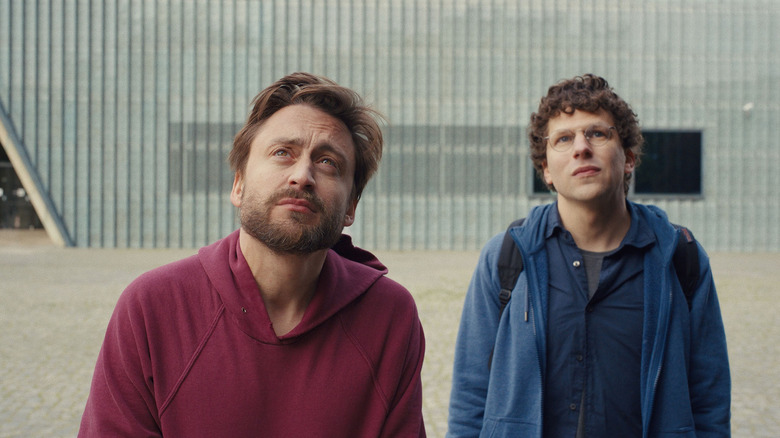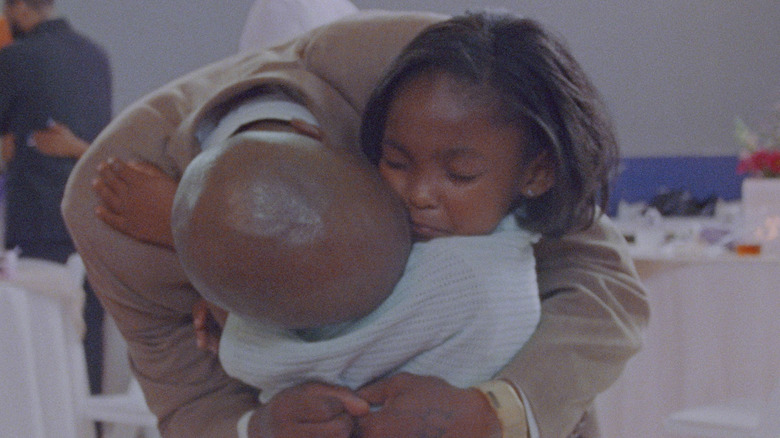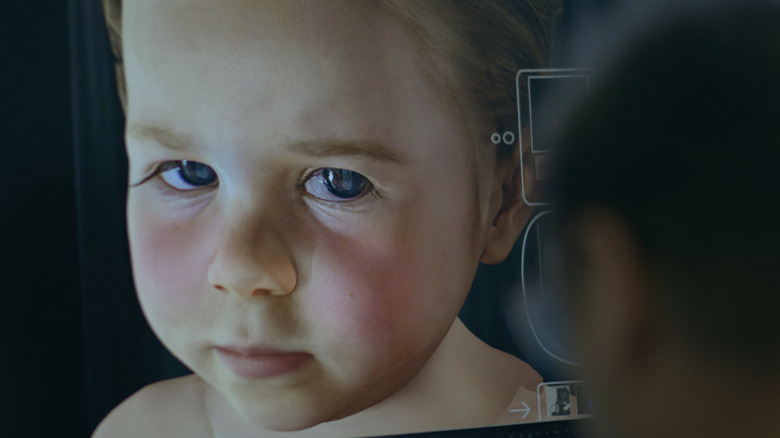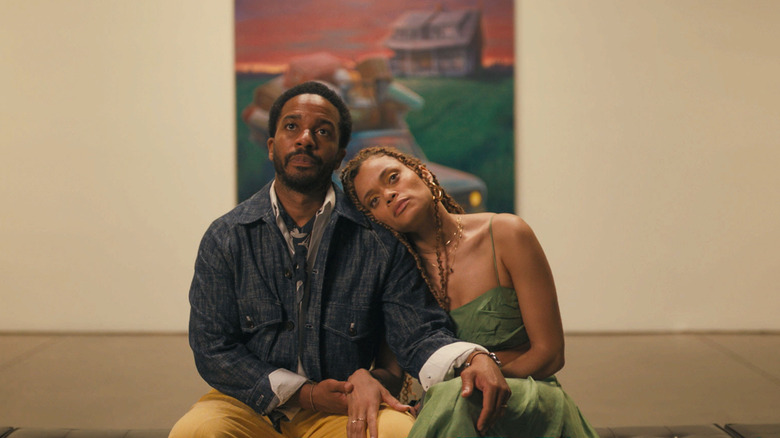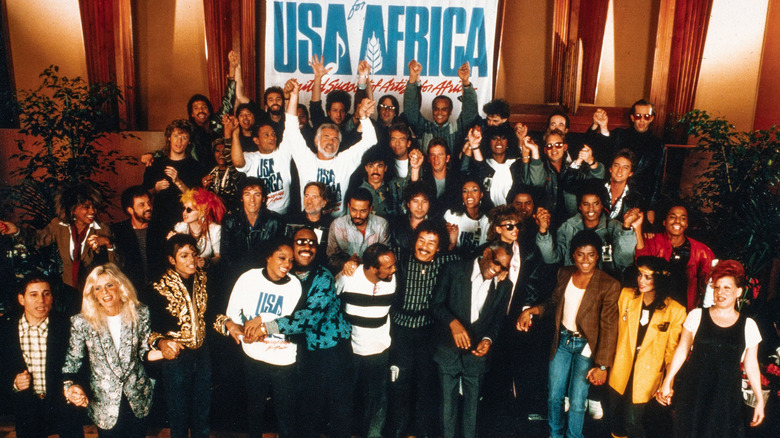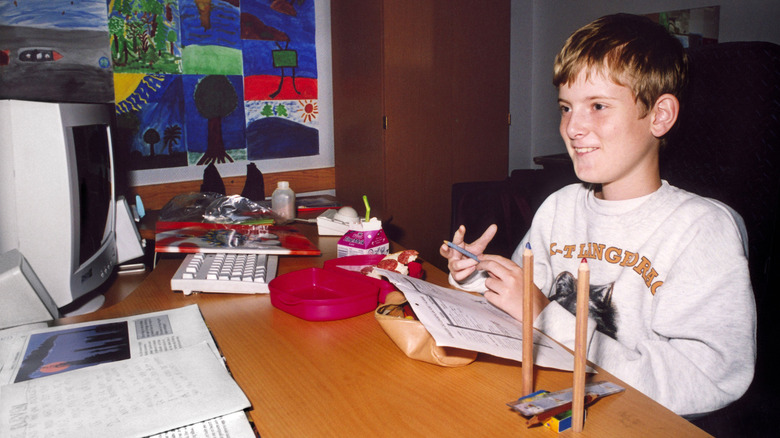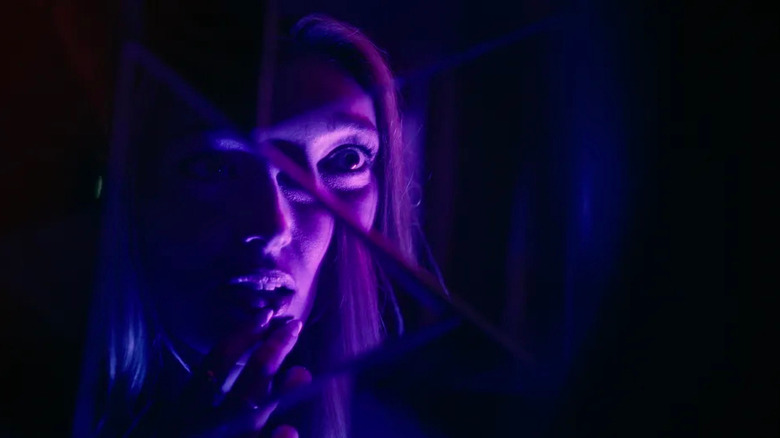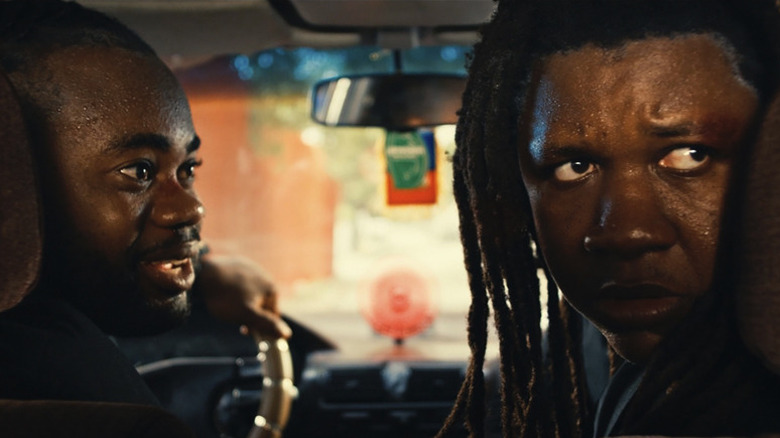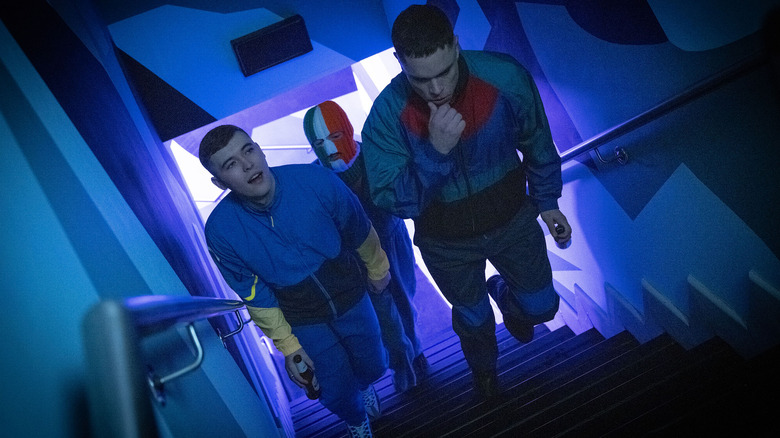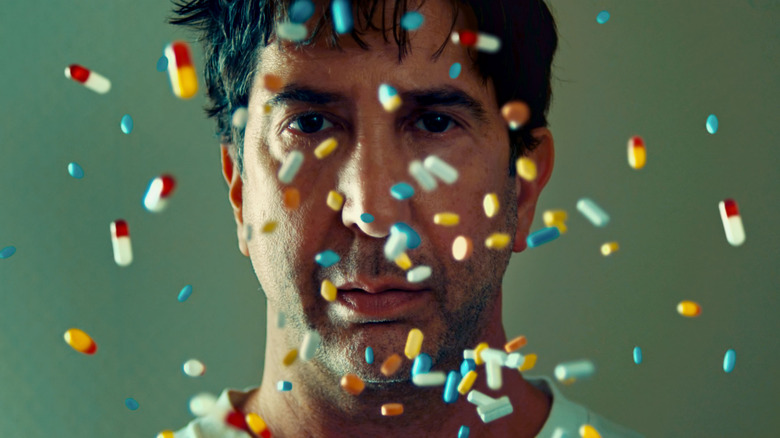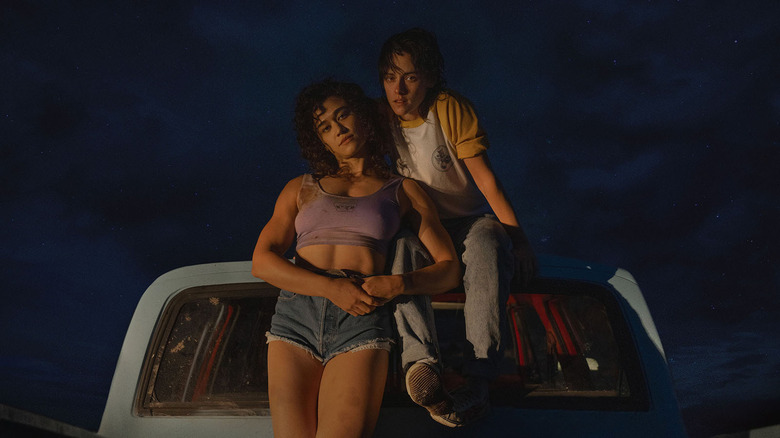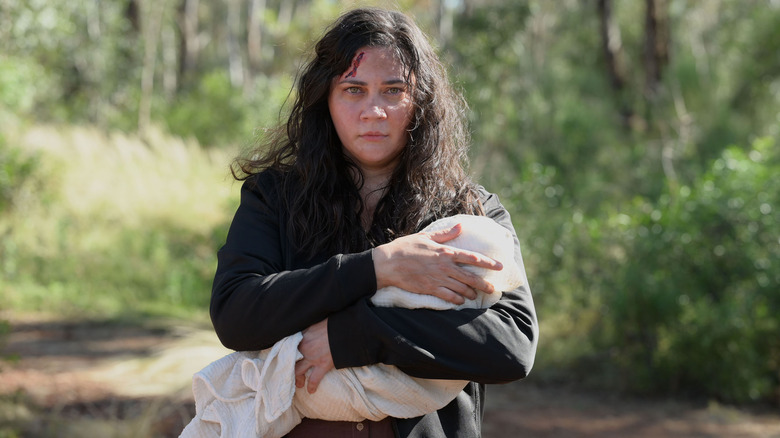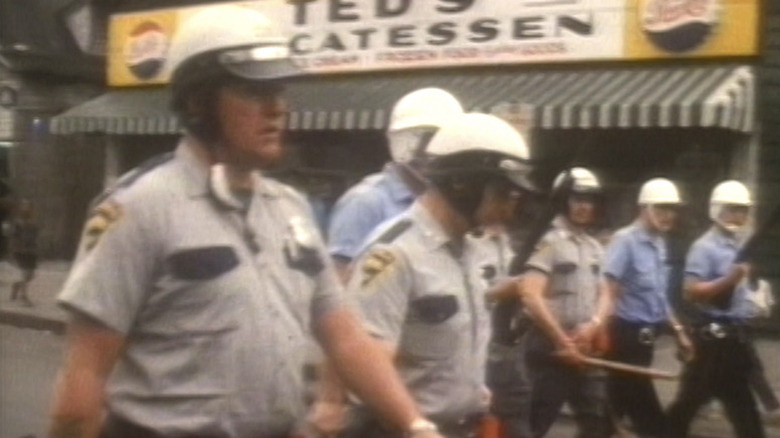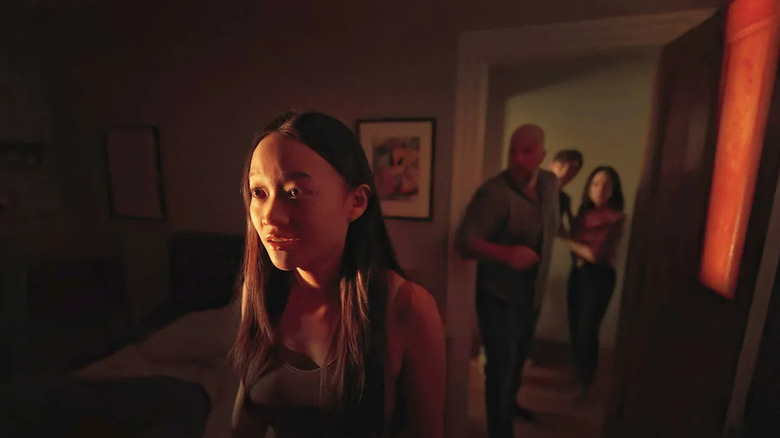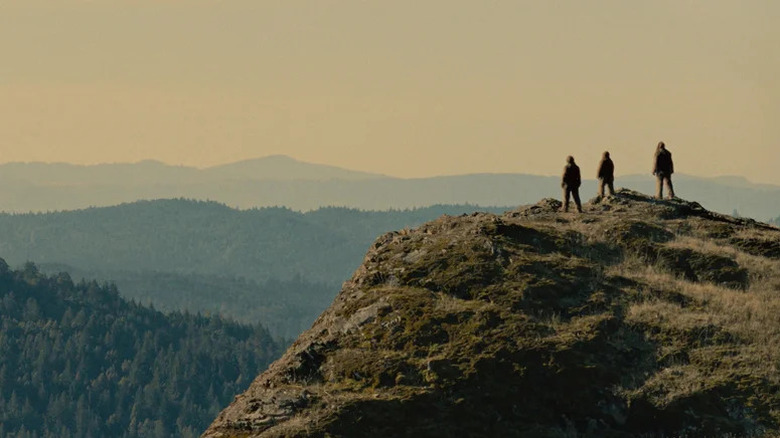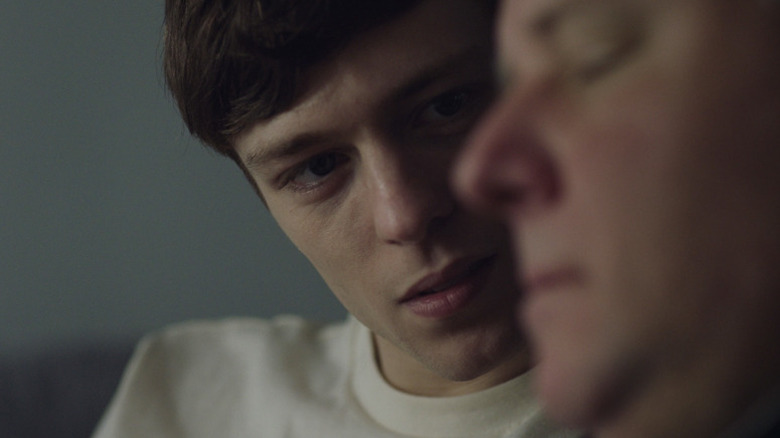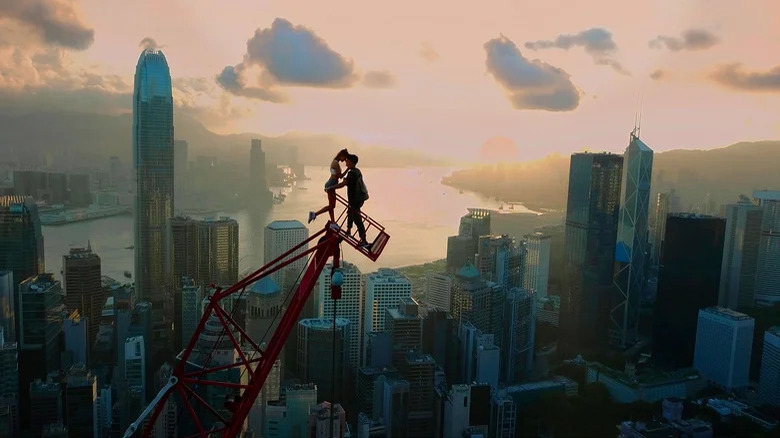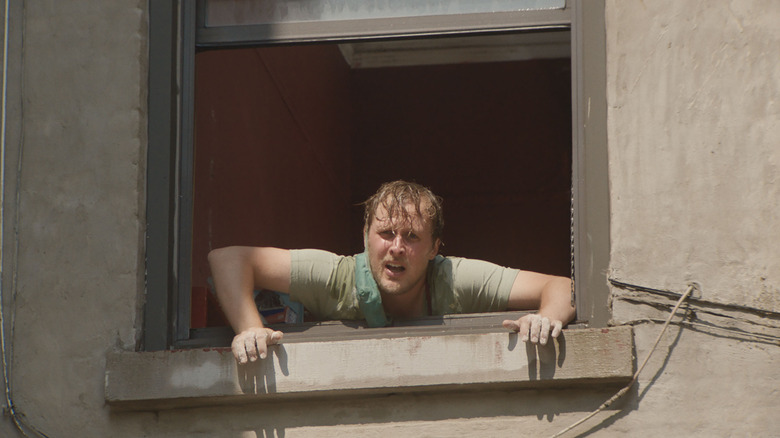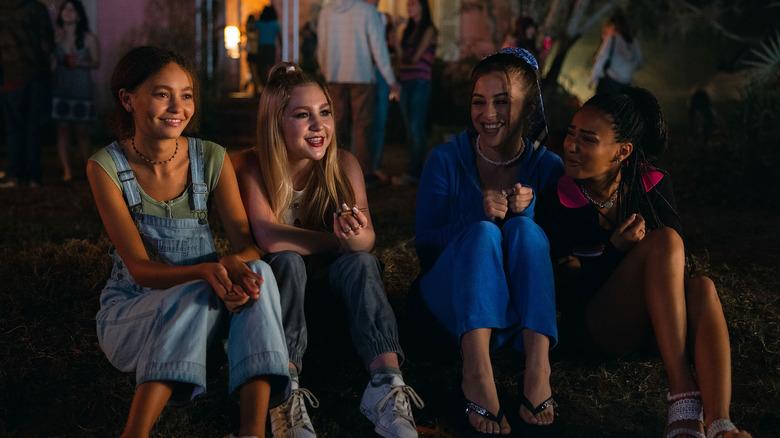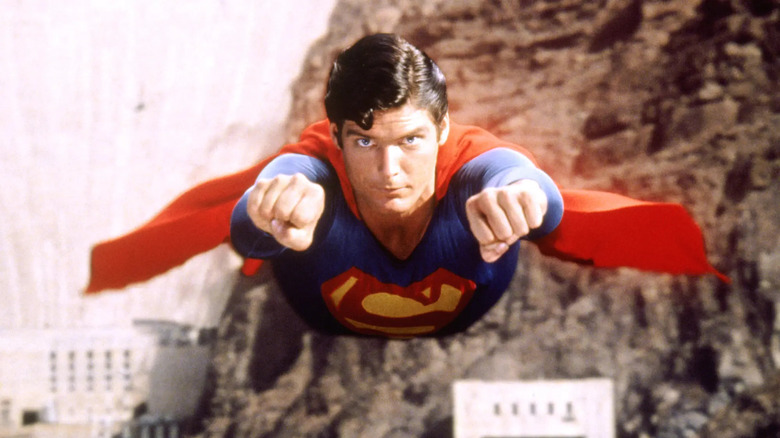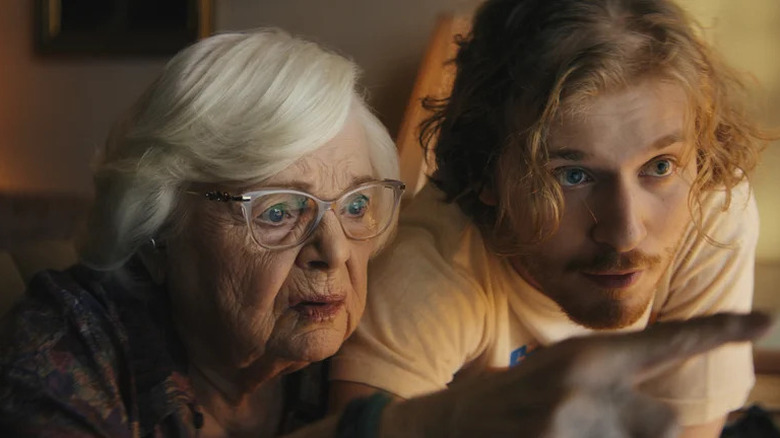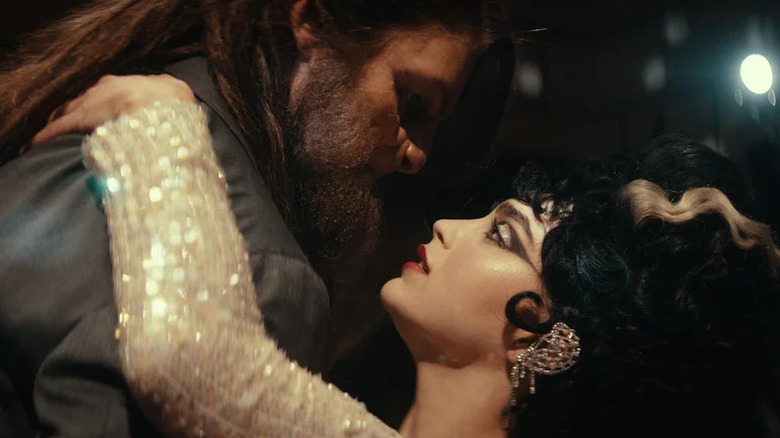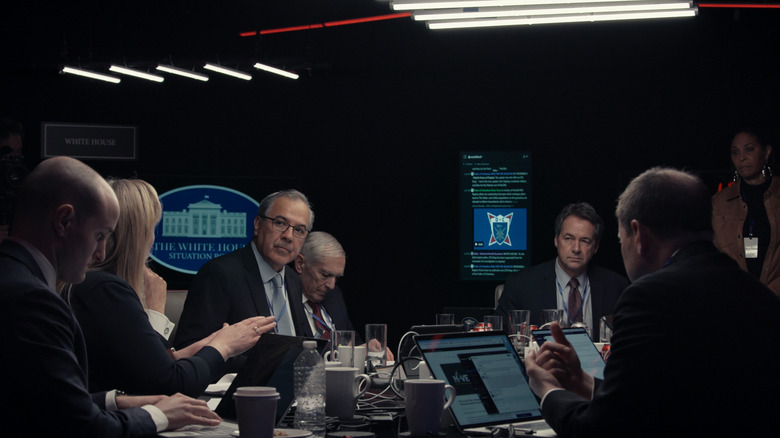Every Movie We Saw At Sundance 2024, From Must-Sees To The Totally Forgettable
The Sundance Film Festival returned to Park City this year, bringing with it a cavalcade of new films, many of which we'll probably be talking about throughout the rest of 2024. We've rounded up looks at every film we watched at Sundance this year, bringing you insight into the best, the worst, and everything in between. As always, we urge you to seek out these films for yourself. Movies live and die by their audience, and many of the films at Sundance are small affairs that need to find viewers in order to thrive. So don't just take our word for it — give yourself over to a new movie, one you might not even have noticed. There are more than big studio blockbusters in the film world, and they need your help. Our list below is merely a guide, it's up to you to take the journey.
A Real Pain
I found Jesse Eisenberg's directorial debut, the 2022 Sundance entry "When You Finish Saving the World," to be a big misfire; a cringefest that had very little to offer its audience. So I am immensely surprised by Eisenberg's sophomore effort, the wonderful, heartbreaking "A Real Pain." On the surface, this is a simple movie — two cousins, played by Eisenberg and Kieran Culkin, travel to Poland on a sightseeing tour in the wake of their beloved grandmother's death. She was initially from Poland, and the plan is to tour several sights with a group (sights that include a concentration camp) before visiting their late grandmother's childhood home.
Eisenberg, who also wrote the picture, uses this setup to follow the cousins on a journey not so much of self-discovery as it is self-realization. They already know who they are, the trip simply heightens it. Grief and loneliness hang over the film, but it's not a dour experience — indeed, it's often quite funny. But then there will be sudden, unexpected moments that reduce you into a sobbing mess. It's one of the most effective movies of the year, and proof that Eisenberg is actually a filmmaker to watch. All of this is underscored by a brilliant, raw performance from Culkin. Culkin's character Benji is a damaged, haunted, troubled young man, but he has something Eisenberg's character David lacks — charisma. As David says at one point, Benji can "light up a room and then sh*t all over it." Culkin has to walk a tightrope here — in a lesser performer's hands, Benji could be an incredibly distasteful character. But the actor strikes the perfect balance, bringing out Benji's damaged humanity and buried warmth. I know the year just started, but this is bound to be one of those performances people remember all through 2024. (Chris Evangelista)
/Film Rating: 9 out of 10
Daughters
Anyone who's paying attention knows the U.S. prison system is f***ed. But "Daughters," a documentary about a group of young girls who participate in a daddy/daughter dance in a prison with their incarcerated fathers, explores the ripple effects of how the system has set up its inmates to fail.
The film follows several daughters as they prepare to reunite with their dads at this dance, presenting a range of emotions and reactions from girls of different ages. Five-year-old Aubrey, whose father was taken away one night without being able to say goodbye to her, is thrilled at the prospect of seeing her dad again, whereas the 10-year-old Santana, who is better able to understand that her family's situation is the direct result of her dad being locked up, has more complicated feelings about confronting her father. The doc also brings cameras into the prison to watch the inmate participants as they undergo a multi-week series of discussions with a fatherhood coach, allowing them to open up about their relationships with their own fathers, the societal factors that contributed to their imprisonment, their responsibilities as dads, what they can do to remain in their daughter's lives, and much more.
Without being didactic or ham-fisted, Patton and her co-director Natalie Rae shine a light on the evils of these institutions and how the system is not only uninterested in rehabilitating its captors, but actually has a financial interest in keeping its inmates behind bars. The film wisely never delves into the specific crimes these men committed; in doing so, it asks the audience to put judgments aside and think about the injustices of a system that goes out of its way to prevent human contact between a father and his children for years at a time. Seeing these girls reunite (and sometimes reconcile) with their loved ones is incredibly affecting, and just may change the way you think about the way this country handles incarceration.
Emotionally devastating and hauntingly tragic, "Daughters" provides a clear playbook for rehabilitation. Unfortunately, it doesn't seem as if the prison system is interested in adopting it. (Ben Pearson)
/Film Rating: 9 out of 10
Dìdi (弟弟)
If you track the types of movies that have premiered during the 40 years of the Sundance Film Festival, you'll see patterns that began to emerge that aligned with the programmers' tastes and came to define the festival's identity. In one sense, Sean Wang's "Dìdi (弟弟)" falls squarely into some of those familiar tropes: It's a coming-of-age drama about a young person trying to find themselves, occasionally clashing with those he loves and messing up in relatable ways as he grapples with where he comes from and what he wants to do with his life. That shape is familiar, but rarely have those types of films focused on Asian protagonists, so it was nice to see this writer/director have the space to riff on those tropes and put his own spin on them.
Izaac Wang stars as Chris, aka "Wang-Wang," a 13-year-old Taiwanese American kid growing up in California who loves skateboarding and making dumb videos with his friends. He feels stifled by his grandmother, has a complicated relationship with his artist mother (Joan Chen), and gets into sibling screaming matches with his older sister (Shirley Chen), who's about to go to college. Sean Wang sets the action in 2008, rendering the final era when AOL Instant Messenger and MySpace were crucial tools in the social lives of teenagers, and Izaac brings an engaging precision to the young, introverted protagonist as he struggles with romance and slips in and out of friend groups.
"Dìdi (弟弟)" isn't trying to push the envelope, take any big narrative swings, or upend any conventions. While the movies that do those things tend to generate much of the buzz from film festivals, there's something to be said for delivering a sturdy and compelling drama with effectively drawn characters. Writer/director Sean Wang's previous project, "Nǎi Nai & Wài Pó (Grandma & Grandma)," was just nominated for an Oscar for Best Documentary Short Film, so clearly, he's a talented filmmaker who is now squarely on my radar as an exciting up-and-comer to watch. (Ben Pearson)
/Film Rating: 7 out of 10
Eternal You
It's been more than 10 years since "Be Right Back," the episode of "Black Mirror" starring Hayley Atwell and Domhnall Gleeson that centered on communicating with a version of a dead loved one created by artificial intelligence. Now the real world has basically caught up with that sci-fi premise, and "Eternal You," a new documentary from Hans Block and Moritz Riesewieck, dives into the murky quagmire of what that means.
While AI companies aren't yet to the point that they can create an android that looks and interacts believably like a human, several of them now provide less extreme services to bereaved people who are desperate for ways to get closure after experiencing devastating personal losses. One uses ChatGPT to create a chat bot that types in the deceased's voice. Another uses vocal cloning technology to allow the dead to "speak" with the living in a familiar voice. A third tries to embed a digital nervous system into a digital baby so it can react in truly realistic ways when it's being interacted with. And yet another uses scans of audio and videos to create a digital replica of a dead person in virtual reality, so a mother can don goggles and interact with a daughter who died tragically young.
The doc does an excellent job of presenting several sides of the ethical and moral debate surrounding the existence of these companies and services, allowing tech bro founders the room to wax poetic about humanity's inevitable (to them, anyway) digital immortality while also featuring interviews with journalists and ethicists counteracting the points that were just made. There are interactions that appear to be positive for the customers, but a handful that are tragically negative: One of the dead men "speaking" through a chatbot tells his living lover that he's currently in hell, which naturally disturbs her a great deal, while another begins swearing at and threatening his own daughter.
In one exchange between siblings, a brother explains to his sister (who has been using a service to communicate with her dead lover) that these services may have been created with good intentions, but are still working in a capitalist system that is designed to extract money from the bereaved. At another point, someone says, "We don't know how consciousness is produced, which is a very important step if you want to replicate it with a machine." The filmmakers give the appearance of objectivity, but including moments like these seem to be subtle hints about where they stand in these debates.
There are some gut-wrenching lines here as you watch subjects have these digital interactions and grapple with the consequences, and one well-deployed shot of a cemetery is especially effective; it's a simple image on its own, but given the context of the conversations around it, viewers can almost imagine digital zombies rising from all of those graves. I'm lucky enough not to be in the position of having just lost a close loved one, so I'm in no position to cast judgment on these people or claim there's a "right" way to grieve. But one thing seems clear: Capitalizing on the digital afterlife is likely going to be a lucrative business model in the years to come. If you'd like to see a glimpse of what's coming, "Eternal You" provides an effective, if slightly depressing, primer. (Ben Pearson)
/Film Rating: 8.5 out of 10
Every Little Thing
Sundance documentaries can sometimes center on depressing subject matter — grim stories that shine a light on the worst aspects of humanity. Thankfully, "Every Little Thing" is the exact opposite. This doc follows Terry Masear, who lives in the Hollywood hills and has spent years with a single minded focus: to nurse injured hummingbirds back to health. She's received over 20,000 phone calls from L.A. locals who've stumbled across hummingbirds in desperate need of help, and Terry has carved out a niche as the go-to person to provide the space and physical therapy necessary to heal the tiny creatures.
The film tracks the recuperation and progress of several birds who are brought to Terry's sprawling compound, showcasing Terry's amazing eye for diagnosing them and her dedication to seeing them get healthy enough to be released back into the wild. Each has a distinct personality, and the film is at its best when we're seeing them improve. Director Sally Aitken presents some incredible slow-motion photography of hummingbirds in action, giving us "Planet Earth"-style close-ups and allowing us to marvel at the majesty of these pint-sized critters.
But there are several shortcomings that left me wishing the movie was willing to delve deeper. A connection is drawn between Terry's past and what drives her to care for these hummingbirds, but the film fails to provide more than surface-level insight. Stories are brought up but never touched on again, causing a vague sense of incompleteness; what seem like set-ups for key observations are left as dangling threads. The timeline of the film is unclear, so we don't get a sense of how long the recovery process takes. How can Terry afford to life in this gigantic home in one of the most expensive cities on Earth when it seems like she's doing her work for no money? How many other people, if any, typically assist her with any of this work? There are plenty of shots of adorable hummingbirds — and they truly are adorable — but the movie raises more questions than it answers.
Light, breezy, and a celebration of doing the right thing, "Every Little Thing" provides an example of seemingly pure goodness in a world that desperately needs more of that. I admire the intention behind it, but can't say I was left fully satisfied. (Ben Pearson)
/Film Rating: 6.5 out of 10
Exhibiting Forgiveness
Andre Holland is one of our best actors — he has a presence and a voice that captures us in almost hypnotic ways. Anytime he gets to lead a project, it's worth paying attention to, and that's certainly the case with Titus Kaphar's contemplative "Exhibiting Forgiveness." Here, Holland plays Tarrell, a brilliant artist who paints huge pictorials that represent memories from his childhood. That childhood, we soon learn, is fraught and full of trauma — trauma that causes Tarrell to wake up screaming and violent at night, scaring both his wife (Andra Day) and young son (Daniel Michael Barriere).
Tarrell's trauma is rooted in his relationship with his estranged father La'Ron (John Earl Jelks), a recovering drug addict who was abusive to Tarrell and his mother Joyce (Aunjanue Ellis-Taylor). All these years later, La'Ron says he's a changed man, and Joyce urges Tarrell to give the man a second chance. But that won't be easy, and through a series of disturbing flashbacks, we see why. Holland is magnificent here, bringing a raw intensity to the part; he's a man burning up inside. And he's matched by Jelks, who is phenomenal, playing La'Ron not as a monster but as a very damaged man with trauma of his own. How can this father and son ever reconcile? Is it even possible? There are no easy answers, and Kaphar's film isn't interested in wrapping things up in a neat little bow. Instead, the film feels quiet and reflective, with a burning heart at its center, all of it accentuated by an incredible musical score from Jherek Bischoff. While some of the dialogue can border on preachy, "Exhibiting Forgiveness" impresses with its humanity and its honesty. (Chris Evangelista)
/Film Rating: 7 out of 10
The Greatest Night in Pop
You've heard "We Are the World," the perfectly cheesy 1985 pop song featuring more than 40 of the best pop superstars in the world at the time (and Dan Aykroyd, for some reason). But have you ever thought about the logistics of how that song was actually recorded? I sure hadn't, but director Bao Nguyen's latest documentary is catnip for process nerds like me, taking the audience through the song's inception and incredible single-night recording session in irresistible fashion.
Inspired by the success of the UK supergroup Band Aid's ability to raise money for famine relief in Ethiopia, the great Harry Belefonte cooked up an idea to do something similar stateside. Lionel Ritchie, Michael Jackson, and Quincy Jones were enlisted to write and produce a song, and with those mega-talented names attached, it was easy to lure other superstars of the era — Stevie Wonder, Tina Turner, Billy Joel, Hall & Oates, Dionne Warwick, Huey Lewis, Bruce Springsteen, and Bob Dylan, just to name a few — to participate as well. In the pre-internet, pre-mobile phone era, organizing everyone's schedules to find a date and time that worked for all of them should have been impossible, but Richie, the ringleader of this wild circus and this documentary's most frequent talking head interview, and his team found a way to wrangle all of these disparate personalities and make it happen.
You won't learn why Dan Aykroyd was there (seriously, how the heck did he end up singing next to Harry Belefonte?), but thanks to the fact that multiple camera operators were tasked with capturing the events of that fateful evening, "The Greatest Night in Pop" provides a complete portrayal of every major beat of the recording session. The fly-on-the-wall footage is the true star here, giving the audience a thorough look at what it was like to gather dozens of the biggest names in music (many of them ego-maniacs) and guide them toward a common purpose for a common cause. The best part of the footage, though, is seeing these powerhouse performers out of their element, intimidated in the presence of other legends, and slightly unsure of themselves and their abilities. It's shockingly intimate — superstars of that era did not often project insecurity, so to see them in a state of nervousness humanizes people we've long viewed as icons. We also get to see many unused takes of their recordings, demystifying the process a little and reminding audiences that even though these people are legends in their field, it still takes work to achieve greatness.
There are aspects I would have liked to have seen focused on more (several participants are all but ignored given the hour and 36-minute runtime), but "The Greatest Night in Pop" certainly lives up to its name by delivering a jaw-dropping and occasionally even transcendent peek behind the curtain of one of music's biggest moments. (Ben Pearson)
/Film Rating: 9 out of 10
Ibelin
In 2020, director Benjamin Ree brought a mesmerizing documentary called "The Painter and the Thief" to the Sundance Film Festival, and it won the World Cinema Documentary Special Jury Award for Creative Storytelling. Now he's back with "Ibelin," which has won both the Audience Award and the Directing Award in the World Cinema Documentary category at the 2024 festival. Those prizes are well-deserved: "Ibelin" is one of the best films of 2024.
Mats Steen was born with Duchenne muscular dystrophy, an incurable disease that progressively weakens one's muscles, resulting in an early death. His parents watched their son eventually waste away, missing out on the relationships, love, and dynamics they wished he'd be able to experience, and instead spending his time immersed in the online universe of World of Warcraft. But when Mats died at age 25, his parents received a flood of messages from Mats' online friends and learned he was living a vibrant digital life, experiencing exactly the types of things they'd hoped for him, but just in a more unconventional setting.
Thanks to a log of all of Mats' digital interactions, Ree utilizes World of Warcraft character models and the gaming apparatus to recreate Mats' digital life, and coupled with narration from a blog Mats kept at the time, as well as interviews with the real-life people with whom he was interacting, the audience is able to immerse ourselves in Mats' world and watch him experience those emotions and relationships, painting a detailed life of an empathetic, good-hearted young man who cared for others, frequently offered sage advice, and fell in love.
"Ibelin," which moved me to tears several times, is almost like "It's A Wonderful Life" for the digital era: A reminder that everyone has the potential to have profound impacts on those around them, and a deeply moving celebration of the power of connection. (Ben Pearson)
/Film Rating: 9.5 out of 10
It's What's Inside
Greg Jardin, the writer and director of "It's What's Inside," a fantastic new thriller that premiered at Sundance this past week, is already attempting to control his own movie's identity. At the film's premiere in Park City, he implored journalists and critics like myself to not give away what's inside a certain character's briefcase, and from that mandate, you may think this concerns a late-stage plot twist. What it actually concerns is the film's core premise, something that's part and parcel of any discussion of any movie. The reason, I assume, for this request is the fact that "It's What's Inside" does tease out not just its own plot but even what genre of film it's going to be for most of its first act, and the surprise and subsequent excitement by a large, captive audience at the eventual reveal is pretty delicious.
Sadly, it seems that experience will remain exclusive to those of us who were lucky enough to see it with an audience at Sundance, as news has broken that Netflix has not only acquired the film for a staggering $17 million, but that the service will not be giving the movie a theatrical release. As such, I will not spoil the movie, but in hopes of getting the average Netflix user to make a point to watch it rather than accidentally find it a decade from now, I'll give away some tidbits. If you'd like to go in completely cold, read no further, but do know that "It's What's Inside" is one of the funniest, most clever, and narratively ambitious movies I've seen in a long while. (Bill Bria)
/Film Rating: 9 out of 10
Kidnapping Inc.
Doc and Zoe are in trouble. The hapless duo has kidnapped a presidential candidate's son, but through a series of convoluted contrivances, they're not able to turn him in to their boss. Instead, they try to kidnap another guy who looks just like their target — but in all the pandemonium of the second kidnapping, they also end up snagging the lookalike's wife, who is nine months pregnant. Naturally, things even more get chaotic from there.
"Chaotic" is an apt word to describe co-writer and director Bruno Moral's first feature, as the movie's tone (and its characters) end up swinging in all kinds of conflicting directions. The film takes place in Haiti, which opening text tells us features huge numbers of kidnappings as its citizens struggle to make ends meet. While the film begins quietly enough, with Doc (Jasmuel Andri) and Zoe (Rolaphton Mercure) cracking jokes and telling stories as they change a tire with their hostage tied up in the trunk of their car, the rest of the movie is turned up to 11, both in volume and in its outlandish scenarios. This is ostensibly a comedy, but most of the jokes fall flat — the movie seems to treat characters squabbling and screaming at each other as if those situations are inherently funny, even though they're not actually saying anything humorous.
It's also an overtly political film, taking barbed swipes at corruption at the highest levels of the Haitian government. As someone with an admittedly limited knowledge of Haiti's history and sociopolitical status, I'm positive I did not fully comprehend the extent of the political commentary embedded into this movie. But even though some of the movie's jabs surely went over my head, the film's scenes are so heightened and ridiculous that it's difficult to stay engaged with them. Early on, cacophony becomes the movie's operating principle, and by the time it finally slows down enough to catch its breath, it's too late; its ending, which is intended to be a change of pace, doesn't land emotionally because the proper groundwork hasn't been laid for it.
It's a shame, because Andri and Mercure have real charisma — their dynamic is the best part of the film, but they spend so much time trapped in the heightened chaos of the plot that they're rarely given a chance to showcase any shades of that relationship except ones fueled by adrenaline. The premise had promise, but sadly, I thought "Kidnapping Inc." was a muddled miss. (Ben Pearson)
/Film Rating: 4 out of 10
Kneecap
Kneecap is a real Irish rap group consisting of Liam Óg Ó hAnnaidh, Naoise Ó Cairealláin, and JJ Ó Dochartaigh. "Kneecap," the new movie from director Rich Peppiatt, is a film about the formation of that group. Kind of. It's not a biopic — at least, not in the way you might think. See, the rappers actually play themselves in the movie, but the story, as it's told here, is slightly more heightened than the real way it all went down. You can sort out the fact from fiction later if that type of thing interests you, but for the purposes of this movie, it doesn't really matter what actually happened and what's been embellished or made up — the film is its own beast, a propulsive and blisteringly entertaining ride that doubles as a passionate argument for the preservation of native languages at all costs.
Set in the North of Ireland after the Troubles, the story follows two hard-scrabbling, rascally pals who grew up speaking their native tongue despite the British having colonized their territory. Northern Ireland citizens are trying to force the occupying Brits to recognize Irish as an official language, but these two loser characters aren't plugged into the political goings-on of their time — they'd rather just deal (and do) drugs and rough up any "peelers" (cops) who get in their way. But when fate unites with a music teacher at an Irish school who happens to have the ability to make some pretty sick beats, the newfound trio realizes they can use Irish language hip hop to help keep their language alive and rejuvenate it for the young people in their community.
The guys are all natural performers, playing themselves with a natural charm and amiable wit that can't be taught. They're clearly comfortable with each other, lending a real veracity to their scenes together. Meanwhile, Michael Fassbender shines in a small role as one of the guys' fathers, a former Irish revolutionary who has been in hiding for years and suddenly re-enters their lives. He's perfectly cast as a practically legendary figure who looms large over the movie and has exceptionally high expectations for his son.
Rebellious, riotous, and one of the funniest films of Sundance 2024, "Kneecap" is an exhilarating depiction of finding and fighting for a righteous cause, even in the most unconventional of ways. (Ben Pearson)
/Film Rating: 9 out of 10
Little Death
One of the most unexpected films I saw at Sundance this year was Jack Begert's sneaky "Little Death." Here is a film that almost dares you to talk about it, simply because it's not playing by the rules. Essentially two movies in one, "Little Death" begins like a Charlie Kaufman-esque story of a miserable TV screenwriter trying to get his first feature film made. Played by David Schwimmer as a man who looks constantly tired and sweaty, the writer, Martin Solomon, narrates his way through a series of trippy fantasy images clearly created by A.I. He's written a script about his life, but his producers want him to change his lead character to a woman — at which point Schwimmer suddenly vanishes and is played by Gaby Hoffmann. But wait, there's even more trickery at work here.
Without giving anything specific away, "Little Death" suddenly changes everything and becomes the story of two drug-addicted young friends, played by Talia Ryder and Dominic Fike, as they navigate one hellish night in Hollywood. The film doesn't just change lead characters, it completely changes its style and tone, too, going from silly over-the-top surrealism to gritty grounded realism in the blink of an eye. It's jarring, and it doesn't quite click, but it's fascinating to watch. It helps that Ryder's character, Karla, is wholly sympathetic despite her flays, and that Ryder's performance all but single-handedly elevates the material. I don't think the bait-and-switch nature of "Little Death" works, but I appreciate filmmaker Begert's audacity in trying to pull this off. (Chris Evangelista)
/Film Rating: 6 out of 10
Love Lies Bleeding
As with most noir films, everyone is following their hearts here and not their brains (despite some protests to the contrary), and as with most "lovers on the run" films, the lovers are beset on all sides by obstacles attempting to snuff out their flame. Despite all the stylistic flourishes (including a jaw-droppingly squelchy sound design by Paul Davies), "Love Lies Bleeding" feels refreshingly honest in its depiction of love and how messy it can be. Stewart and O'Brian have a fantastic chemistry that holds the screen but never feels self-reflexively "movie star-ish," their vibe so down-to-earth that you may be fooled into thinking the film could be naturalistic at times. Meanwhile, Harris is beautifully slimy, the actor's pronounced intensity on display, of course, mixed with a twinkle of what appears to be affection in his eyes; he may be the Devil, but he seems to consider himself a simple family man.
There's a temptation to call "Love Lies Bleeding" a vision of America from an outsider's perspective, with the London-born, Essex-raised Glass taking a skewed look at our greasy, smelly, sex-and-gasoline-fueled history. While that may be so, the film feels more genuine than anything else, a more America than America portrait in the way that some characters may be more human than human. Its core narrative may not be all that surprising or even shocking, but the depiction feels utterly unique and refreshingly progressive in a way that doesn't feel a need to call too much attention to itself. The enigmatic title (seemingly borrowed from one of a handful of pop songs to use the phrase) at first feels ominous, and certainly could refer to one of the corpses found in the film. Yet it could also be read as less threatening, and even more erotic: bodies excrete, bodies bleed, but that is also a sign of vitality as much as mortality. It's all a matter of perception, you see. (Bill Bria)
/Film Rating: 9 out of 10
Love Me
Stop me if you heard this one before: in a post-apocalyptic world, a lonely buoy and a friendly satellite fall in love. That admittedly bonkers scenario is at the core of Sam and Andy Zuchero's sweet but frustrating "Love Me." Dealing with the trappings and limitations of social media, "Love Me" uses its end-of-the-world scenario to stage an unlikely love story. After some cataclysmic event has wiped out all of humanity, a smart buoy named Me drifts alone through a recently thawed sea just outside of the ruins of New York. One day, a satellite named Iam floats overhead and catches her eye. The two strike up a conversation and Me decides to pass herself off as a "lifeform" in order to grow closer to Iam. To do so, she scrolls through the internet — still alive and kicking even after the apocalypse — and happens upon a sickeningly sweet series of videos from content creator Deja (Kristen Stewart) and her husband Liam (Steven Yeun). Using that relationship as a blueprint, Me and Iam enter a Sims-like world where their animated avatars attempt to spark love. But can love even exist between these two objects play-acting as humans?
This is a great set-up, and Stewart and Yeun are more than game for the material. Unfortunately, "Love Me" begins to grow tiresome, spinning its wheels and devolving into a series of arguments between the characters as they struggle to learn who and what they really are. From a purely aesthetic level, the film is a winner — the opening sequences on post-apocalyptic Earth immediately recall Pixar's "WALL-E," while the digital animation used to render the characters into not-quite-flesh is fascinating. But "Love Me" can't quite find the right spark to deliver on its premise. While Stewart and Yeun are great performers, their characters are too blank for their own good — how could they not be? They're artificial. Quirky and occasionally charming, "Love Me" comes up short in the end. (Chris Evangelista)
/Film Rating: 5 out of 10
The Moogai
Horror and trauma go hand-in-hand, but at this point, I'm starting to get a little tired of movies that are essentially saying "the real horror was the trauma the characters suffered along the way!" It's not that this is a bad idea, per se. It's just become overused and oversaturated, to the point where I long for an old-fashioned scary movie that has absolutely nothing to do with trauma at all. But that's not "The Moogai," Jon Bell's Australian shocker about a demon that preys on children. Years ago, Sarah (Shari Sebbens) was taken away from her biological mother, Ruth (Tessa Rose), and raised by white parents. Now, Sarah is an adult and about to have a baby. Ruth is back in her life, and Sarah seems to resent that and resent her mother's superstitious ways. But that superstition seems to be warranted. After a difficult birth in which Sarah almost dies, the new mother begins experiencing terrifying visions involving eggs that spew forth both dead, bloody baby chicks and hissing snakes that wrap themselves around the baby.
Is Sarah going crazy, or is an Aboriginal demon known as the Moogai at work? This material seems perfect for a creepy horror movie, but "The Moogai" feels undercooked and underdeveloped. We never really learn enough about Sarah to get caught up in her story, and the film's scares are threadbare and repetitive — Sarah sees something scary, shouts in terror, and then discovers the scary thing wasn't there at all. Or was it?? This happens approximately five different times in the movie, and it begins to get tedious. Still, there are occasional flashes of promise, like a gorgeous wide shot of a ring of fire burning around a dead tree while the sun sets in a pastel sky. And when the Moogai shows up, the creature design is appropriately gnarly. But I wanted more, and I suspect most horror-fan viewers will, too. (Chris Evangelista)
/Film Rating: 5 out of 10
Power
"Policing is a pathway to power."
So says one of the talking heads in director Yance Ford's "Power," a documentary about the history of the police in the United States, its intrinsic link to the history of race in this country, and how it has spun so wildly out of control since its inception. Through a series of interviews and archival footage, Ford tracks the three-pronged origins of how the police came to exercise its power, citing frontier militias displacing indigenous communities, slave patrols in the South, and police forces regulating breaking strikes and regulating working people in order to preserve class order and protect employers' property. As the country grew, those three prongs essentially merged into one and became the basis for the entity we know today.
The film lays out how the reaction to the thousands of rebellions of the civil rights era supercharged police brutality, and how the militarization of the cops was not a one-way street: A case is made that while local precincts received infusions of military-grade weapons and tactical gear, the U.S. military actually adopted techniques used by the police to shape its overseas engagements.
If you've ever read a critical essay about the police, this film probably won't tell you much you don't already know. But as someone who did not grow up being taught the truth about this subject, I'm happy the movie exists. (In fact, I was not taught much of anything about this subject; upon reflection, I realize the lack of spotlighting this institution was, passively or otherwise, a way to perpetuate its worst qualities.) People come to realizations about our society and its dysfunctions at different times in their lives, and though some may question the film's effectiveness or say it's "preaching to the choir," I'm glad it can potentially serve as an on-ramp for folks to reach one of those realization points.
The more on-ramps we're given, the better — especially since truths like the ones presented in "Power," often involving ties to racist ideas or origins, have been purposefully swept under the societal rug. I know I'd like as many of those on-ramps as possible for my own personal journey of knowledge and growth, and I'm hopeful that curious audiences seek it out when it hits Netflix at some point this year. (Ben Pearson)
/Film Rating: 8 out of 10
Presence
Steven Soderbergh's latest feature, "Presence," addresses these concepts in a remarkably effective fashion. While the basic tropes of the haunted house ghost story are present in the film, it's thanks to Soderbergh's maverick, almost impish auteurist tendencies that it transcends and remixes those tropes due to one major change: the entire film is shot from the entity's point of view. This is more innovative than it sounds; while it's true that movies and especially horror films are no strangers to POV, the majority of POV films are of the "found footage" subgenre, and that's explicitly not the case in "Presence." In fact, Soderbergh's film belongs less to the found footage camp but more to films like "Lady in the Lake" and "Hardcore Henry," POV movies where we're seeing events through the eyes of a character and not a camera per se.
Who that character is and what, if anything, they may want lies at the core of "Presence," creating a remarkable sense of tension throughout the film. What Soderbergh, screenwriter David Koepp, and the movie's game ensemble cast have constructed here is a work of such intimate and immediate suspense that the film gets at what most powerfully motivates the ghost as a folkloric, horror/fantasy character: powerlessness. (Bill Bria)
/Film Rating: 9 out of 10
Sasquatch Sunset
"Committed to the bit" perfectly describes the latest feature from The Zellner Brothers (David and Nathan) entitled "Sasquatch Sunset." The film is a 90-minute-long slice-of-life, documentary-style collection of footage that follows the daily trials and tribulations of an average Sasquatch family. There's no dialogue, just a collection of grunts, groans, howls, and other bodily functions that serve as the main form of communication between the creatures. If Sasquatches were real, "Sasquatch Sunset" would serve as a "Planet Earth"-style unfettered look at their existence, their socialization, their habits, and their place in the animal kingdom.
Of course, Sasquatches are not real, and it's in that truth that the uncanny tone of the film lies. Given that what we're watching is a film featuring human actors in makeup acting like mythical creatures, the movie could be seen as a tedious exercise in irony, an overlong sketch, or an "Adult Swim"-type troll (the movie's penchant for scatological humor would lend itself to this interpretation). Yet there's something else at work in "Sasquatch Sunset," as indicated by that title; the film ultimately feels like a moving expression of something that the author John Koenig dubbed "anemoia," where a sense of nostalgia is created for a thing that never was. (Bill Bria)
/Film Rating: 7 out of 10
Sebastian
As an artist, how far would you go to achieve authenticity in your work? That's one of the questions posed by "Sebastian," Finnish-British writer/director Mikko Mäkelä's new film about Max, a 25-year-old London-based writer who adopts an alter ego as a sex worker named Sebastian to use those experiences as a means of capturing a sense of truth in his first novel.
Ruaridh Mollica turns in an effective performance as Max, bringing an appropriate mixture of arrogance and insecurity to the role. He's ostensibly doing this work for research, but it quickly becomes clear he's still finding himself as a person and this exploration is another avenue through which to do that. As sex work begins to take up more of Max's time, his day job — freelancing for a magazine — and personal life — specifically his friendship with his co-worker, Amna, played by Hiftu Quasem, who makes an impression in a small part — begin to suffer, and "Sebastian" starts to veer into familiar and less interesting territory.
One aspect where it does not feel familiar is in its graphic depiction of sexuality. The movie is not afraid to fully embrace its subject matter, and while part of that is refreshing (especially in comparison to the sex-starved climate of modern American filmmaking), I can't shake the notion that it also contributes to the movie starting to feel like it's grafted onto a formula that robs it of some of its originality.
Eventually, Max strikes up a tender romance with an older man (the great Jonathan Hyde, who you'll recognize from "Titanic" and the original "Jumanji"), and when his writing starts to reflect that relationship, his publisher pushes back, saying readers don't want to hear about the intimacy and cultural baton-passing from one generation of gay men to the next, but rather want to have an unvarnished look at what modern sex work looks like. That sets up a creative conflict for Max: Does he give in to his publisher's request, or go with his gut?
Raw, unsparing, and ultimately a bit disappointing, "Sebastian" didn't connect as much as I'd like, but at least it put some promising up-and-coming talent on my radar. (Ben Pearson)
/Film Rating: 7.5 out of 10
Skywalkers: A Love Story
Watching 2018's "Free Solo," the Oscar-winning documentary about rock climber Alex Honnold's daring attempt to scale Yosemite's El Capitan with no ropes to protect him from potentially falling, was such a visceral viewing experience, it caused my palms to sweat.
The same thing can be said of "Skywalkers: A Love Story," director Jeff Zimbalist's new documentary about Angela Nikolau and Ivan "Vanya" Beerkus, two Russian "rooftoppers" who have become famous for breaking into skyscrapers, climbing to their highest possible points, and taking photos and videos for social media. The two begin the film as rivals, but team up to work together and eventually ... well, the phrase "fall for each other" carries a heavy connotation given their particular niche, so let's just say their dynamic changes as they survive some ridiculously dangerous climbs and come to love one another. Armed with a phalanx of GoPros, cameras, and drones, Vanya is the straightforward tactician, while Angela, whose parents were circus performers, brings an artsier touch to their "work," performing acrobatics and gymnastic poses mere inches from precipitous drops. They balance each other out.
If you're scared of heights, this film is basically your worst nightmare. (Ben Pearson)
/Film Rating: 8.5 out of 10
Stress Positions
In "Stress Positions," the wonderfully named Terry Goon (John Early) is going through a divorce at the height of the pandemic in New York City. Retreating to a brownstone owned by his soon-to-be ex-husband, Terry has taken to caring for his nephew, Bahlul (Qaher Harhash), a 19-year-old Moroccan male model with a broken leg. Terry tries to keep Bahlul sequestered and safe from the pandemic raging outside, but his friend Karla (Theda Hammel, who also directed the pic) is too curious and insists on visiting. In the midst of all of this, other characters drift into orbit, like Karla's girlfriend Vanessa (Amy Zimmer), who stole Karla's life story for a hit book. There's also Grubhub delivery person Ronald (Faheem Ali), who seems to always be working, dropping off food to both Terry and Karla at all hours of the day and night.
Narrated by both Karla and Bahlul, and at times shot almost like a horror movie, with dread lurking around the frame, "Stress Positions" is hard to pin down. It's a strange, curious film that seems to be trying not so much to tell a story as it is trying to capture a moment. Specifically, the period of time during the COVID-19 pandemic when everything seemed otherworldly and doomed. Terry dons a gas mask and sprays everything clean; he pauses conversations to bang pots and pans out the window in support of essential workers; and the 4th of July is looming, the promise of BBQ get-togethers in concrete yards too strong to resist, virus be damned. At the same time, "story" is very much a part of the film. Specifically, the telling of stories, who owns those stories, and how much truth is necessary. As Karla puts it at one point, "Fiction is freedom." Funny in an almost melancholy way, "Stress Positions" drags on a bit too long, and its unfocused narrative doesn't help. But Hammel is a filmmaker with a keen eye and voice, capturing the mood and time of the story with sharpness. (Chris Evangelista)
/Film Rating: 6 out of 10
Suncoast
Every once in a while at Sundance, a film comes along with a performance from a rising star that feels like it will follow that person for years. Shailene Woodley in "The Spectacular Now" and Elizabeth Olsen in "Martha Marcy May Marlene" are two good examples; both of those actresses have gone on to have solid careers, and when they come up in conversation, those indie performances are still spoken of fondly by film fans. My hope is that "Suncoast" will be that movie for up-and-coming star Nico Parker. She's been on the scene for a few years now (she appeared in Tim Burton's "Dumbo," but you may better remember her as Joel's daughter in the pilot episode of HBO's "The Last of Us"), and this handsomely made debut from writer/director Laura Chinn is a terrific showcase for Parker's strengths as a young performer.
She plays Doris, a high school girl living in Florida with her frazzled mother (Laura Linney, playing it big but still believable) and slightly older brother, who has spent the past six years ravaged by cancer and is not able to move on his own. Doris desperately wants to have a normal teenage experience, but her brother's situation — and her mom's single-minded focus on caring for him and making sure Doris cares for him, to the significant detriment of her own relationship with Doris — has kept her on the sidelines. But when her brother is moved into the same assisted living facility where Terri Schiavo lives (the film is set in 2005, and the Schiavo case is a big part of the story's backdrop) and her mom decides to sleep by her son's side, that opens up their small house as a potential hang-out spot for Doris and her classmates. She quickly makes friends by offering to host a party for the cool kids (played by Ella Anderson and Amarr, among others), and while so many other movies follow the tropes of mean girls who take advantage of the mousy Doris and use her for their own means, "Suncoast" actually lets Doris form legitimate bonds with them.
Parker, who turns in a natural and wonderfully felt performance, also forms a bond with an activist played by Woody Harrelson, a Christian man who is still reeling from the death of his wife and was inspired to join a protest about Schiavo's treatment at the facility. The two are on the opposite ends of the ideological spectrum but are able to find common ground through listening to one another (something Doris absolutely does not get from her mom), and Harrelson is understated but excellent in his supporting role.
Brimming with authentic details (the story is based on Chinn's experiences with her own brother), "Suncoast" is a moving family drama that, in years past, would have been a clear launchpad to the next phase of Parker's career. Hulu has already acquired this film, and it'll get a limited theatrical release on February 2 before hitting the streaming service on February 9, 2024. Let's hope that type of launchpad effect is still possible in the streaming era. (Ben Pearson)
/Film Rating: 9 out of 10
Super/Man: The Christopher Reeve Story
For the release of Richard Donner's "Superman: The Movie" in 1978, an ingenious ad campaign was launched that centered around promising audiences something no movie could hope to deliver. "You'll Believe A Man Can Fly," read the tagline on the one-sheets, supplemented by a beautifully evocative painting of clouds and the "S" shield logo. As audacious as this campaign was, it nonetheless was part of the ethos surrounding the film and the depiction of the titular character. While it's true that certain visual effects techniques were developed to make the flying sequences in "Superman" try and live up to such a promise, Donner knew that the element he really had to focus on was casting the part. If audiences believed in the man, they'd believe he was flying.
As fate would have it, Donner found the perfect Superman (not to mention Clark Kent) in Christopher Reeve, a then-unknown Juilliard graduate who was urged not to take the gig by no less than his off-Broadway castmate, William Hurt. Reeve not only took the part, he made it his own, becoming a star in the process of encapsulating an idealized fictional character. When Reeve suffered his near-fatal accident in 1995, falling off a horse and finding himself paralyzed from the neck down, the contrast between the virile movie star and the disabled accident victim was as shocking to the world as it was to the man suffering from it. To his immense credit, Reeve did not shy away from either spotlight: he used his public image and the clout that came with it to shine a light on all manner of disability issues, from accessibility to research funding. He even refused to let his movie career fall by the wayside, acting in several more films and directing others.
While Ian Bonhôte and Peter Ettedgui's documentary "Super/Man: The Christopher Reeve Story" recounts Reeve's journey with appropriate tenderness, it isn't a hagiography. It consistently reminds audiences that this was a real human being, and not actually a savior from another star. That said, the doc isn't interested in dispelling the mythical status that Reeve's persona inadvertently became so much as it attempts to reconcile the two: how could any average person live up to a character like Superman? How could they (and their family) suffer so much and still keep going? "Super/Man" delves into those questions and more, finding truths that are powerful, emotional, and inspiring, making the doc relevant in bigger ways than just the story of an actor. (Bill Bria)
/Film Rating 10 out of 10
Thelma
Writer/director Josh Margolin, who's making his feature directorial debut, never plays the situation for laughs. A lazy approach would be to tell this story at a remove, giving the audience enough distance where we'd be tempted to look at these characters as if they're animals in a zoo. Aw, look at the cute old people! Aren't they precious? But according to the press notes for the film, "Thelma" is based on a real-life experience that happened to Margolin's grandmother (video footage of her appears briefly in the end credits), and you can feel that this is a personal movie for him. He treats this subject matter seriously. That's not to say there aren't moments of comedy, but when they come, they're never at the expense of the characters. There's no "rapping grandma" humor here — Thelma's plight is handled with respect, and by putting us in her perspective, Margolin allows us to empathize and see the world through her eyes. Considering how Hollywood typically treats elderly actors (and, frankly, how America treats its elderly population in general), this approach is extremely rare. (Ben Pearson)
/Film Rating: 8 out of 10
Your Monster
"Your Monster" would be a slight but winning film if it merely stopped there, allowing Monster and Laura to become a couple and get one over on the egotistical Jacob. Yet Lindy isn't interested in making a syrupy film; inspired by her own life experience, "Your Monster" delves into thornier issues. The movie explores the way relationships in the art world (romantic and otherwise) can be positively or negatively misconstrued, the way romantic feelings for someone else don't turn off like a light switch even after they've treated you atrociously, and the disturbingly surreal feeling of being a young person struggling with a life-threatening disease (something this writer has personal experience with).
All of this may be too much for the film to bear were it not for the deft tonal control Lindy has over it, and Barrera's performance is the glue that holds it all together. While the cast of "Your Monster" all bring something wonderful to the table, this is Barrera's movie, and deservedly so: she not only proves herself adept at being a Diane Keaton-esque rom-com lead, but makes Laura believably downtrodden. Her performance allows the film to focus tightly on the major theme of repression, where Laura's failings have less to do with ability and more to do with keeping her emotions pent up. (Bill Bria)
/Film Rating: 9 out of 10
War Game
"War Game" isn't what one might consider a typical horror movie, but thanks to its subject matter, it's one of the scariest films you're likely to see in 2024.
Two years after the January 6, 2021 insurrection, a collection of current and former U.S. intelligence agents, Army veterans, defense specialists, senators, and high-ranking advisors meet near the U.S. Capitol to participate in a secret national security exercise overseen by a non-partisan veterans organization called Vet Voice. With concerns running high that the next real-life insurrection could involve members of the active duty military, this unscripted exercise was concocted to see how the federal government might respond to a contested presidential election in 2024, and another attempt to stop the peaceful transfer of power on January 6, 2025. This time, the loser of the presidential race openly calls for rebellion by encouraging military members to ignore orders from the President and take up arms against their countrymen. It's January 6 on steroids.
Is the United States ready for that? What kinds of decisions would need to be made in the situation room if such a scenario were to occur? With the participants assigned to various roles (example: the governor of Montana portrays the President of the United States), directors Jesse Moss and Tony Gerber take us inside that room to witness how it might all go down. A timer is set for six hours to see if democracy can be saved, or if the insurrectionists will overrun the country.
Without spoiling how the exercise pans out, when we look back on "War Game" at this time next year, hopefully, the whole thing will feel like an unnecessary precaution. At best, maybe it'll seem like a prequel to Alex Garland's "Civil War." But at worst, it might seem like a prophetic prediction of a terrifying reality — one for which we should have been much better prepared. In hindsight, this could end up being the scariest movie of the year. (Ben Pearson)
/Film Rating: 8 out of 10

